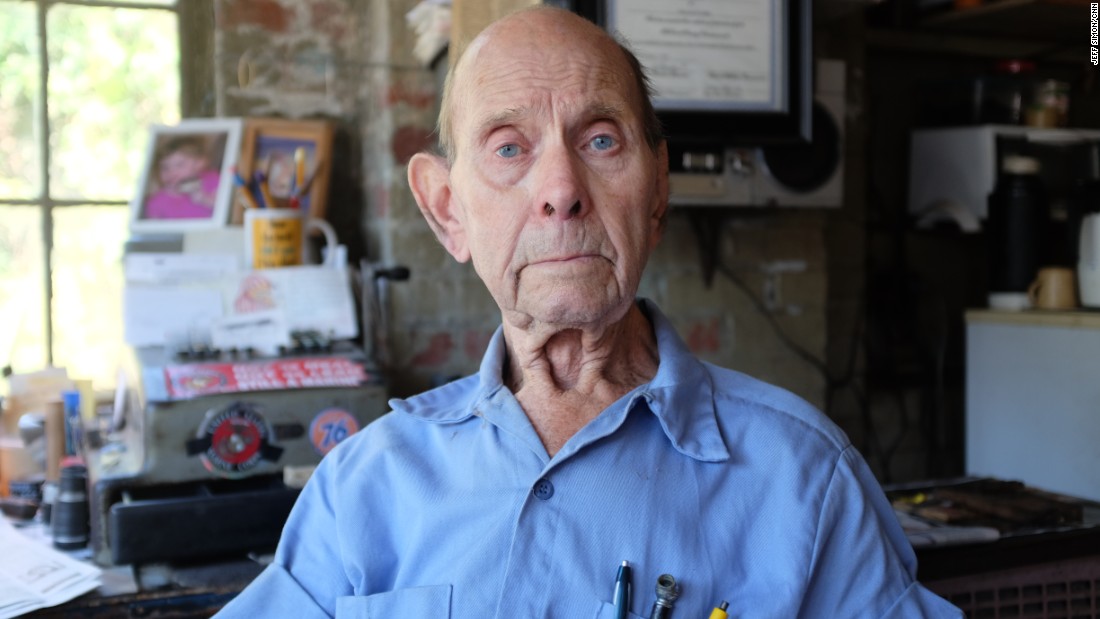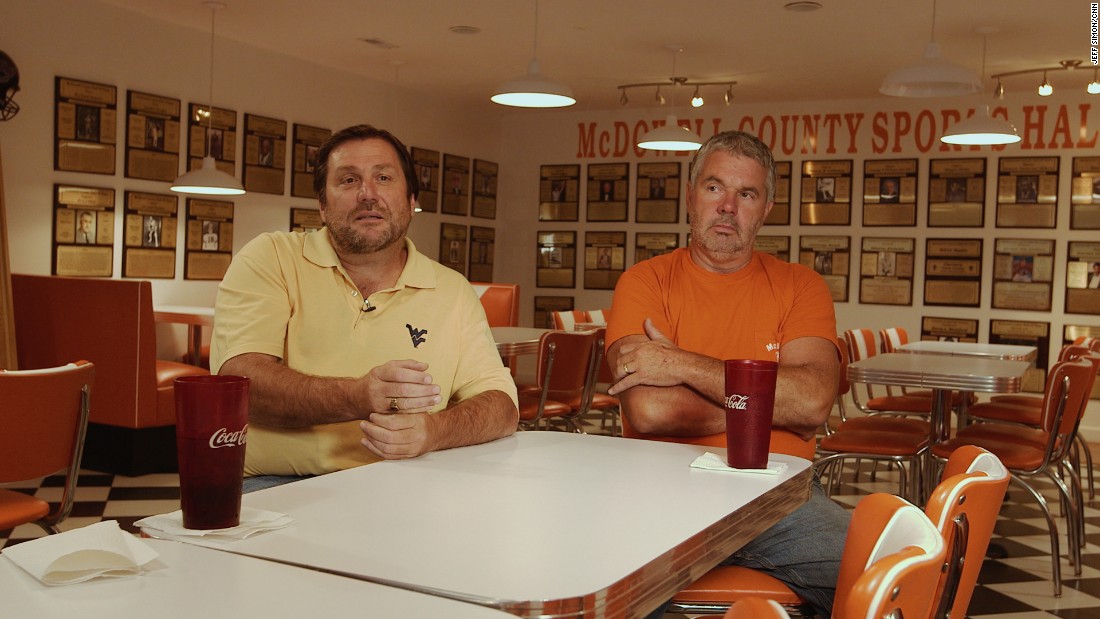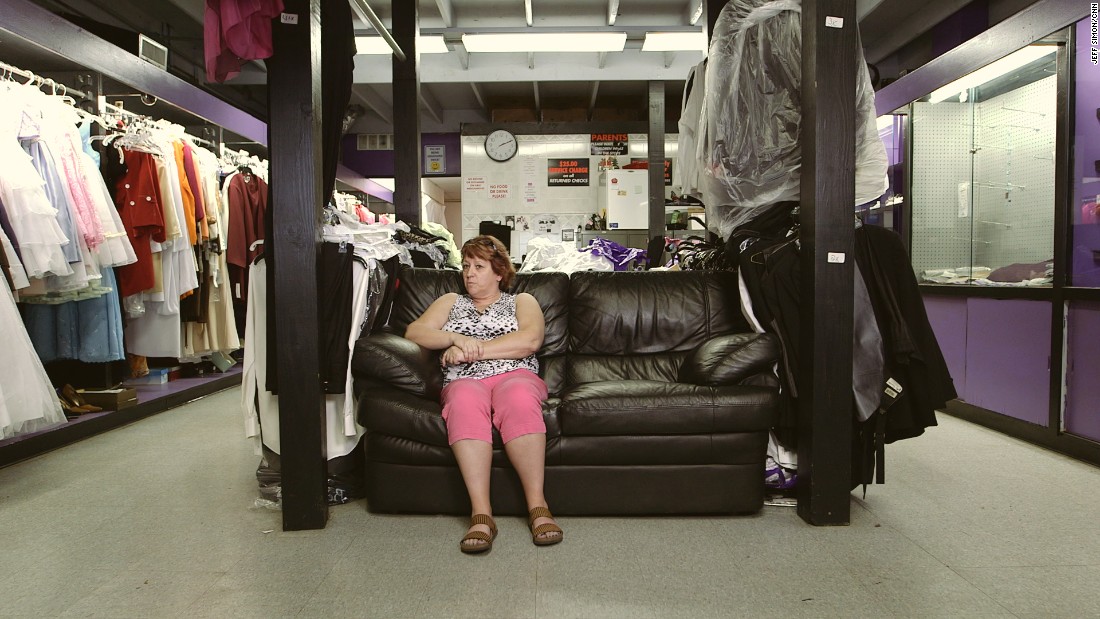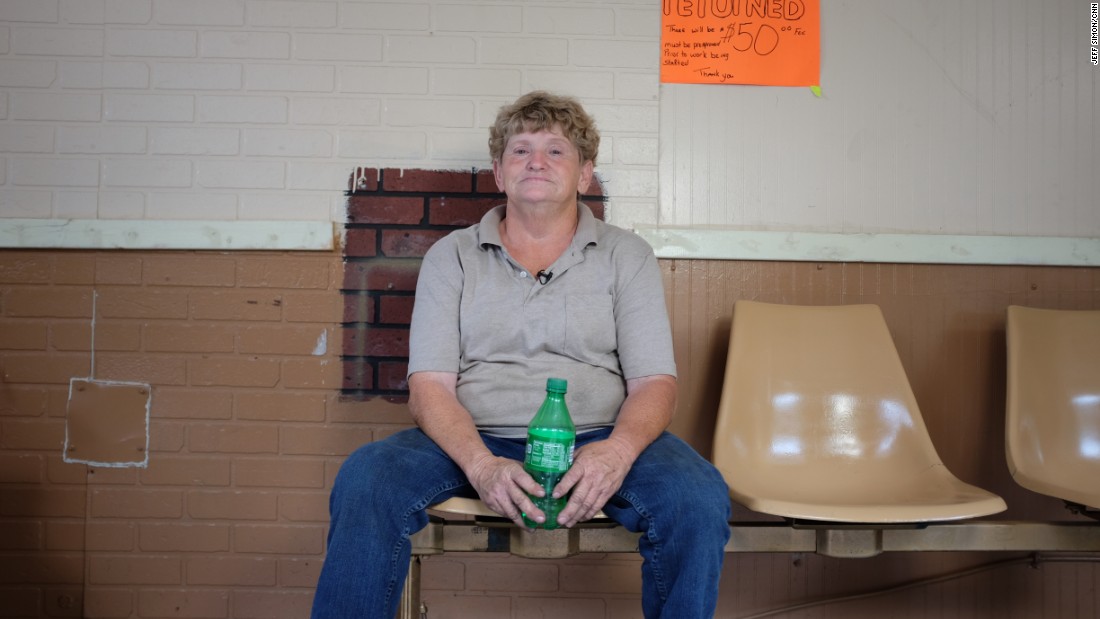The 'forgotten tribe' in West Virginia; why America's white working class feels left behind
Updated 9:10 AM ET, Tue September 20, 2016
White, Working-Class and Worried is a CNN partnership with the Kaiser Family Foundation - an extensive survey of white, working-class Americans and voters, who form a backbone of the support for Donald Trump. Watch Anderson Cooper 360 and CNN.com for reports throughout the week.
Welch, West Virginia (CNN)Each morning for the last 65 years, 93-year-old Ed Shepard has walked to work to open up the Union 76 service station, here in rolling hills of West Virginia coal country.
When he looks out his window, he can see a sweeping mural that shows what life in Welch used to be like. A United Cigars shop on one side of the street, a Western Union sign on the other. Lines of cars stretch into the distance. Even Shepard himself -- who is as much a fixture of Welch as any of its buildings -- is in the mural, a blue cap perched on his head.
"There wasn't ten square feet in this town that didn't have a successful business in it, a business of every kind," Shepard said in an interview. "No matter what you wanted or needed, you could buy it in Welch."
Those were better days.
Now it's a place, people who live here say, that politicians use as a convenient photo op and that the federal government has left behind, a sentiment common among white working class voters. 56% of non-college educated whites say the government in Washington does not represent them, according to a new poll conducted by CNN and the Kaiser Family Foundation. And two-thirds say they are dissatisfied with the influence people like them have on politics.
Locals referred to the once-bustling Welch as "Little New York," but now the town and the county around it are slowly slipping away. The storefronts are empty. The buildings and houses here are now crumbling with decay. Shepard used to take checks to the bank each Monday -- sometimes $1,000, sometimes $1,500. He hasn't had to do that in four or five years he said, because he hasn't had one customer in that long.
"It's depressing to watch the population disappear, the business disappear and the activity to stop," he said. "Back in the 50s, 60s, 70s, it'd be hard to walk up the sidewalk because there was so many people. Now you walk up the sidewalk and there's nobody."
McDowell County's population is just 19,835 down from 100,000 in the 1950s. That decline is expected to continue. West Virginia University economists estimate that McDowell will continue to lose residents at a rate of 1% each year.
Some, particularly in rural areas like McDowell County, say the government's at fault. Rural working class whites are more likely to blame the federal government for their economic problems than their urban counterparts. Seven in ten say the federal government deserves all or most of the blame for the economic problems facing the working class, in the CNN Kaiser survey, compared with half of urban working class whites. That could explain the appeal of a candidate who is not only intent on upsetting the political system, but has at times seemed bent on breaking it down to start over again.
On this winding drive through the hilly roads of Appalachia, there are few signs signaling support for Hillary Clinton or Donald Trump, but Trump is expected to do well here. West Virginia hasn't voted for a Democrat since Bill Clinton's second term. Much has changed in the last 20 years and now Clinton is seen as squarely at odds with the coal industry, which is the bedrock of Welch and the surrounding county.
No matter who wins in November, some residents of West Virginia coal country don't believe anything will change their lives. They have come to accept, as Gary Hall, a 55-year-old Trump supporter put it, "that next year is going to be worse than the last year" no matter who is president.
Hall said he felt alienated from the political process, but rejected the idea that he and other whites without college degrees were angry and flocking to Trump as a result. The CNN/Kaiser foundation survey suggests that's the case, too. Just 19% of working class white voters described themselves as angry about how things are going in their own lives.
"We're conditioned that there's really nothing you can do about it. The only thing outrage and protesting and stuff does is cause bad feelings," he said. "People are just resigned to have what they have. The ones that want to leave, the ones that can leave and want to leave leave. Everybody else just stays here."
Rural working class white voters like Hall are more likely to say America's best days are behind us and that their children will be worse off than they are today. In the CNN/Kaiser survey, 58% of rural working class whites say America's best days have come and gone and 57% say their children will be worse off compared with less than half of urban working class whites who say the same.
West Virginia is one of the nation's largest coal-producing states and McDowell County used to produce more coal than any county here. But there's been a steep downturn in coal jobs across the state due to competition with cheaper natural gas, tougher environmental rules and mechanization, and this county has seen the worst of it.
"We don't have another option," said Cecil Patterson, 51, who spent his life working in the coal industry and serves on McDowell County's county commission. "Once we shut down the coal industry here there's nowhere to go, there's nothing else to do, there's no other jobs available."
The unemployment rate here was 12.5% in July, compared with 4.9% nationwide.
When work dries up, people leave, Patterson said, doing anything they can to make ends meet.
"You can't just go to the next county here, you have to leave the state. A man tries to go out of the state, maintain an apartment, try to keep his home back up here, it just puts such a struggle on the family."
Trump won McDowell handily in West Virginia's May primary, taking 91.5% of the Republican vote -- his largest margin of victory in the country. But even before becoming his party's presumptive nominee the week prior, he was the favorite to win in the state.
During a campaign rally in West Virginia in May, Trump promised to bring back lost-coal mining jobs but hasn't said how he'd pull it off. Many people here were skeptical that he could -- but credit him with giving them hope.
And animosity toward Clinton runs high. Even months later, people still repeat -- verbatim -- the comment Clinton made that her climate change policies would "put a lot of coal miners and coal companies out of business."
Many people here with ties to the coal industry -- virtually everyone here is linked to it -- see Clinton's comments about coal disqualifying and Trump as their only answer.
"It ain't gonna be Hillary," said 34-year-old Ryan Barnette, his face black with soot, minutes after leaving the mine. "She wants to shut down the coal industry -- that's gonna put me out of a job."
Elaine Lacaria -- known here as Laney -- was a lifelong Democrat and voted for Clinton eight years ago. But now things have changed.
"I won't vote for her again. No, never," she said in an interview in the dress shop she opened in 2008, the same year then-Senator Barack Obama was elected president.
In the eight years since then, she said things have gotten worse. Jobs have dried up, people are leaving and not coming back and addiction has ravaged this community and others near it.
"When we drive anywhere you see small town USA is no more," Lacaria said. "This has affected all of us, not just the coal fields."
Lacaria said she'll never vote for a Democrat again and this year, she'll support Trump.
"When I see Trump as a businessman, I think he will help our county definitely, but I think he will help our country as a whole. He knows what he's doing."
Patterson, who also said he plans to vote for Trump due to his support of the coal industry, said the same.
"When we wake up the morning after an election, our roads are going to be getting worse, our sewer, our water, our schools are failing, Patterson said. "They want us to keep paying more and we keep getting less, so there's my take on where we're at the day after the election."
Others, like 69-year-old Vira Rose, say no politician or government got them in this position. And they don't expect to be saved.
Rose, who was one of the first women to work as a mine foreman in the area, owns her own auto repair shop. She once sold new tires, now a stack of used tires for sale sits outside of the shop. People can't afford new ones anymore, she said.
"Sometimes I come here at 8 a.m., I get out of here at 8 or 9 at night. Any job comes, you don't turn it down and say tomorrow. If you say tomorrow, tomorrow won't be here. You grab it, you do it -- then you help others," she said. "We're the forgotten tribe."
She has no faith in Clinton or Trump.
"What am I gonna do? I'm not gonna vote for neither damn one of them," Rose said. "Because there's not much difference, there's really not."


!["She [Hillary Clinton] wants to shut down the coal industry -- that's gonna put me out of a job. Wouldn't be real smart to vote for somebody who's gonna put you out of a job." -- Ryan Barnette, 34](http://i2.cdn.turner.com/cnnnext/dam/assets/160914161052-ryan-barnette-welch-west-virginia-super-169.jpg)


No comments:
Post a Comment